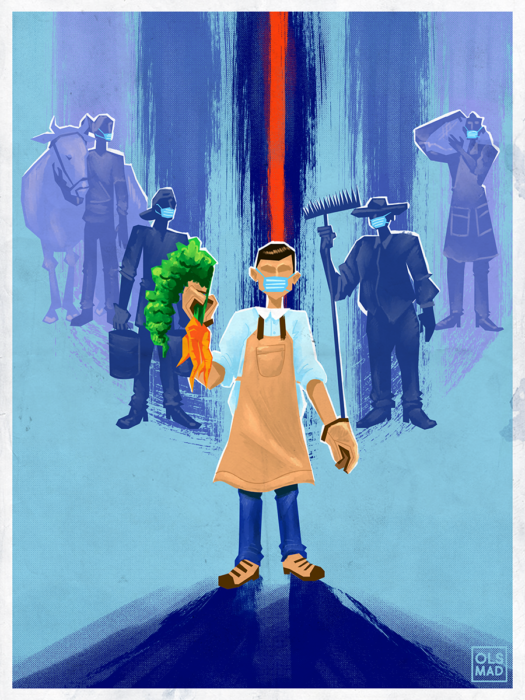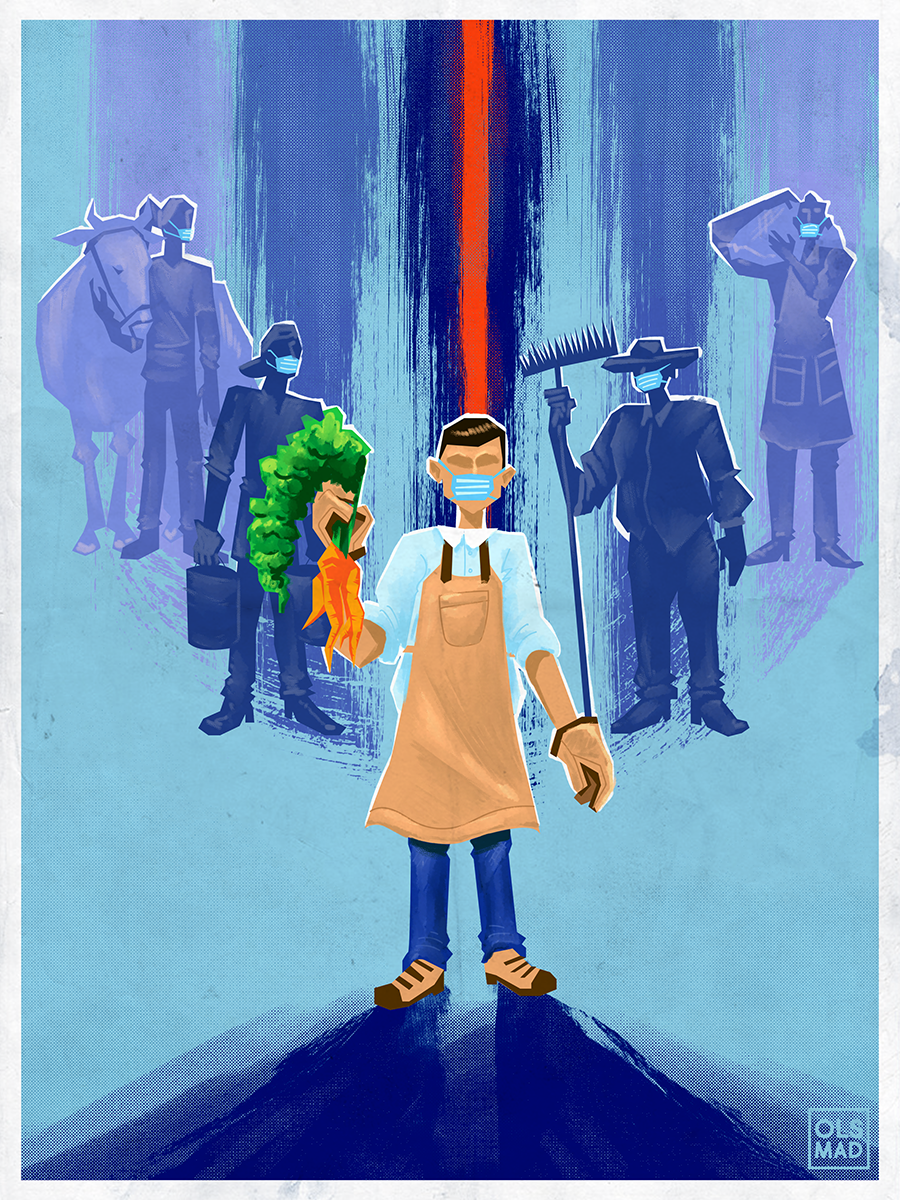
As the magnitude of the COVID-19 crisis grew, California Governor Gavin Newsom on March 19 issued a statewide shelter-in-place order. That’s when Armando Elenes started getting the phone calls. About one-third of the nation’s produce and two-thirds of its fruit comes from California, so some of the state’s 850,000 farmworkers were curious: do we still go to work?
The answer was yes. “You’re designated ‘essential,’” Elenes, the secretary-treasurer of the United Farm Workers union, recalled. “And the reaction was immediate: ‘Oh, now we’re essential.’”
Read all our coverage of the novel coronavirus
From the standpoint of maintaining a functioning society, it’s no surprise farmworkers are deemed essential employees — without them, the nation’s agriculture industry would grind to a halt. But this critical slice of the U.S. labor force is particularly vulnerable during the current public health and economic emergency. Most of them are low-paid to begin with, and their living and working conditions exacerbate odds of transmission. About half of farmworkers are undocumented immigrants, making them ineligible for much of the assistance included in the latest Congressional stimulus package.
I spoke with Elenes this week to discuss UFW’s response to the crisis and to get a grasp of what’s ahead for the nation’s farmworkers. Our conversation has been edited for clarity.
Jake Bullinger: First off, what puts farmworkers at an elevated risk of contracting the coronavirus?
Armando Elenes: Well, one, they are great carpoolers. They figured out rideshares way before Uber. Most workers don’t have driver’s licenses or resources for a car, so you’ll have four, five, seven workers in a van going to work. You’re all touching each other in some way or another. When they get to the job site, they’re often right next to each other. If you’re picking strawberries or lettuce, you’re right next to each other. And you’re obviously using your hands a lot — to move the product, touch the equipment, so that’s a huge issue for possible spreading of the virus.
And then, of course, the housing conditions for guest workers. There could be 20 of them in a house, four to six to a room. All in close quarters. So a guest worker is going to work in a van or a bus, all together. They come back and are staying in the same housing unit. They’re not familiar with the country. A very high percentage does not have health care at all. So those workers are much more at risk.
So when did you realize the outbreak was going to affect farmworkers, and how did UFW respond?
Around the first week of March, most farmworkers were acting like nothing was going on — they just weren’t getting any information. The employers were not engaging whatsoever. On March 11, we did a poll on social media. We were trying to figure out what non-union farmworkers, in particular, were hearing. We asked: are you being provided information about the coronavirus by your employer? And the results blew me away. I would say almost 300 farmworkers responded within 24 hours, and about 90 percent said no. I thought it was a mistake at first, so we did a second one. The percentage stayed the same. At that point, we said, we’ve gotta do more.
We sent out an open letter to ag employers on March 17th. We were asking them to implement best practices — wash hands for 20 seconds, don’t touch your face, practice social distancing, all the things we’ve become much more familiar with. We also called on the ag industry to waive the 90-day requirement for workers to have access to sick pay. We asked for employers to stop asking for doctor’s notes to get sick pay, and for paid leave to be extended to at least 40 hours.
That was based on our experience over the years with employers making it difficult for farmworkers to use sick pay. Some employers ridicule employees for even asking for it; some just flat out deny it. We’ve seen the patterns, and this was before the coronavirus. So imagine you’re a worker, and you might be sick and it might be the coronavirus, but since you feel like you can’t ask for sick pay, you’re going to go to work.
How have growers responded?
Our union employers, right away, were first adopters. Chateau Ste. Michelle, the huge winery up in Washington state, had already started distributing informational leaflets and implementing social distancing. They reminded workers they had sick pay available to them, and family-based health care. And even if you don’t work the hours required, they said, you won’t lose your coverage. Balleto Vineyards, up in Napa Valley, is offering paid sick leave and health insurance for guest workers — they’re going above and beyond. Another farm, they’re going to do a hazard pay bonus of $500 for working during this period.
But I’m hearing that on the non-union side, employers aren’t really changing their practices. In some cases, I get it — if you’re using a harvesting machine with six seats, it can be hard to implement social distancing. But even row crops, where you can have workers skip a row and come back to harvest it, they’re not even doing that. Making sure people wash their hands before and after they get on the bus — there are all sorts of things they can do that don’t really cost them anything. And they’re not doing it.
Y’all were critical of the aid package Congress passed. What are your concerns with the bill?
Let’s start with the 80 hours of paid sick leave. Well, first of all, they excluded employers with 500 or more employees. I guess they assumed these companies are more likely to offer those benefits, but in agriculture, they are so wrong. So you have all these big agricultural operations that are left out. I’m in Bakersfield, California, the heart of the table-grape industry. I think there might be one or two employers with less than 500. Everybody else has, easily, above 500 employees. So you excluded the entire table grape industry. And take lettuce — Tanimura & Antle, thousands of employees. Dole, thousands of employees. All these farms are excluded from the legislation.
At least the sick pay doesn’t differentiate between documented and undocumented, but the direct payments — Congress went out of their way to exclude not only undocumented workers, but also anybody that files taxes with an ITIN number. If you file your taxes with that, that usually means you don’t have a valid social security number. But you’re trying to do your part by being a responsible resident.
All these workers get payroll taxes deducted, social security taxes deducted, but they can’t get the benefits. At the same time, the ag industry got everything and the kitchen sink. They got $9.5 billion, plus $14 billion in low-interest loans.
They left out the workers. Fifty percent or more of agricultural employees are undocumented. So right there, you’re excluding all those workers who were labeled “essential” workers.
It is striking just how many “essential” workers are among the country’s lowest-paid.
A couple workers have said to me: They told us we’re essential, but have shown us we’re not. When I look at my check, when I look at the practices, they’ve shown us we’re not essential.
Workers are scared — petrified — of not being able to work, because they have no other income, but they’re also scared of working. What if I get sick? Who’s going to support my family?
Do you think there’s an opportunity for lasting change to come from this?
I think so. There’s definitely more awareness, and more appreciation that potentially happens. I’ve even seen some colleagues who I’ve known from my childhood — these are anti-immigrant, “deport ’em all” people — who right now are like, “Damn, I don’t know what I’d do if that was my family.”
I hope we can uplift some farms that are providing health care and decent wages, but are taking a hit because of their business models. Those guys need help.
What most people don’t realize is that a farmworker’s hands are the last ones that touch a piece of fruit before a consumer pops it in their mouth. So we better be damn sure we’re concerned about farmworkers. They’re the backbone of the food industry, the ones feeding America.

